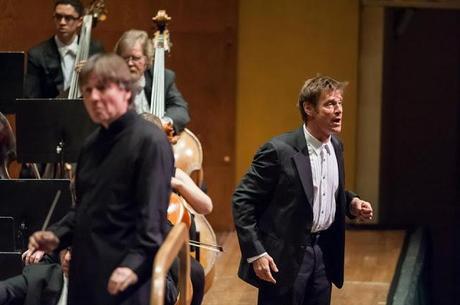
Twentieth-century trauma: Simon Keenlyside as Wozzeck
Photo (c) Lincoln Center/Stephanie Berger
From the outset, the orchestra played with dynamic inflections that made its lyricism seem just a bit off-kilter, portraying Wozzeck's tortured and unavailing attempts to find some sort of balance in a world where even the ground is hollow. Mournful strings and mocking woodwinds, hectic brass and hectoring percussion, structured Wozzeck's encounters with the spiritually myopic Captain and the well-meaning Andres, the sadistic Doctor and brutal Drum Major, and with Marie, his lover and victim. It was during this second scene, with Wozzeck shouting to be heard over the hallucinated Freemasons, that the profound ways in which Berg's work is a post-WWI opera struck me forcibly. Marie's wistful aspirations make her no less trapped than Wozzeck himself, as she gropes for some source of comfort or meaning. Salonen was unafraid to have the orchestra shudder or scream or shout with the singers, as well as mocking the would-be solemn pronouncements of the Captain and Doctor, or the false solemnity of the apprentices. At times mirroring the sinister claustrophobia of Wozzeck's world, and at times mourning it, the orchestra created precisely-etched moments which created an intense and intensely disturbing narrative of disintegration.
The performances of the singers (including the forces of the Westminster Symphonic Choir) were notable for good, vivid characterization and quite good German. The sweet-toned, plaintive Idiot of Harry Nicoll and the wry bitterness of Henry Waddington's First Apprentice were standouts among the smaller roles. The sadistic relish of Tijl Faveyts' Doctor was terrifying, and the consistent tone and clear phrasing of the Belgian bass were admirably expressive. Joshua Ellicott made a stolid but sympathetic Andres, Hubert Francis an appropriately distasteful if not dreadfully menacing Drum Major. Although Peter Hoare, as the Captain, was not always perfectly audible, he used vocal effects well to convey his character's essential sliminess and pusillanimity (I found his gestures occasionally distracting, but that is a quibble.) Angela Denoke impressed me very much with the vividness of her vocal and dramatic performance: her tone was clear at the top of her range, and she shaped her phrases expressively. Her Marie, possessed of a warm generosity as well as sensuality, clearly suffered under the knowledge that she would always be defined by material poverty.
Simon Keenlyside's Wozzeck was so haunted that watching his anguished disintegration was painful. Trying to hold together the fragments of a self constantly reproached and denied by those around him, Keenlyside's Wozzeck seemed from the beginning heartwrenchingly alone. His mental torment (present and past) was realized in physical tics which intensified over the course of the evening, and from which he rarely enjoyed freedom, as he gazed at and murmured against an unresponsive heaven, often scrubbing a hand over his face as if a vision of a less brutal world were only a film of dust away. Keenlyside's apparent fearlessness extended to his vocal as well as his dramatic performance. His use of text and tone was admirable, and in many of the awkwardly shaped lines he revealed an underlying sweetness, and his scenes with Denoke were marked by real tenderness. In vulnerability and fear and rage, however, he roared and cried as well as sang, until driven to the near-inarticulate shrieks of "Weh! weh!" After this, the words of the Doctor and Captain are worse than useless, the dry-eyed calls of the children chilling. It is left to the orchestra to lament and reproach as the trapped protagonists cannot.

